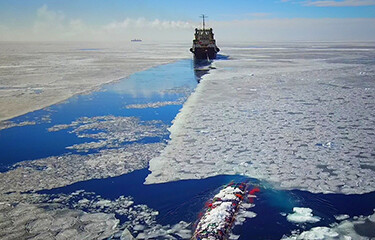The Vladivostok, Russia-based Pollock Catchers Association (PCA) will be able to keep its Marine Stewardship Council certification so long as it follows through on a plan to conduct more-sustainable fishing in three fishing zones in 2022.
The decision came as the association and the Russian government shared concerns that the MSC may be forced to suspend its presence in the country due to Russia’s invasion of Ukraine and the international sanctions levied against Russia in response.
The plan to improve sustainability has been approved by the PCA’s general assembly, and encompasses the Western Bering Sea and Northern Kuril fishery zones, as well as the Petropavlovsk Kommandor fishery subzone in the Bering Sea and the Okhotsk Sea. The plan includes additional monitoring in the regions, including monitoring of trawl-fishing there and research into what impact the fishing has on sea birds.
PCA’s plan, and the MSC’s decision, came in the wake of a statement from MSC CEO Rupert Howes that indicated Russian fisheries were at a risk of losing certificates due to the Russia-Ukraine conflict as “independent certification bodies are prevented from engaging in required auditing, assurance and surveillance activities.”
Despite the increasingly difficult international situation, MSC made it clear that it wants to maintain a presence in Russia.
"The MSC's mission is to end overfishing and this is a global endeavor, reliant on international cooperation – involving fishers, businesses, NGOs and governments,” Howes said. “Conflict threatens this progress, with the future of our oceans and sustainable seafood supplies at stake.”
The statement was backed up by Anisia Shepeleva, the Marine Stewardship Council's representative in Russia, who told Fishnews the certification body will not cease its cooperation with Russian companies, and that certifications issued in previous years will remain valid but new assessments will be paused.
The PCA – whose members account for 76 percent of Russia’s quota for pollock, totaling over 1.46 million metric tons in 2022 – responded in turn to Howe’s statement by committing to adherence to MSC standards no matter what decision the MSC makes in the future.
“All the planned environmental and scientific programs will be accomplished completely regardless of a certification status,” PCA President Alexey Buglak said.
MSC suspending its program in Russia would impact a significant portion of Russia’ catch. The first company in Russia to achieve MSC certification was Gidrostroy in 2009 for its salmon-fishing operations in the country’s Far East. Currently, 27 Russian companies representing 40 percent of the nation's 5 million metric tons of annual catch are MSC-certified.
Buglak told the PCA General Assembly on 22 March he will remain in communication with MSC as the international situation continues to evolve.
Photo courtesy of the Pollock Catchers Association







